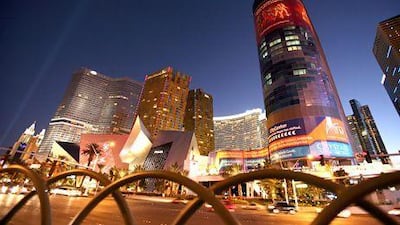There is a stronger buzz in the shops and restaurants at CityCenter in Las Vegas as more tourists are flooding in with money to spend and looking for a good night out.
The fortunes of the development part-owned by Dubai World reflect a broader rebound in a city that was hit hard by the economic downturn in the United States.
Hotels struggled to fill rooms and construction projects were halted as the money ran out. But now development is picking up again.
MGM International Resorts received a boost in 2007 when Dubai World bought a 9.5 per cent stake in the company for US2.4 billion. Together they built CityCenter, an entertainment, shopping and hotel complex.
In the first quarter of this year CityCenter's adjusted earnings before interest, taxes, depreciation, and amortization (Ebitda) related to resort operations was $93 million, almost three times the $32m reported in the same period last year. The company is now planning to build a 20,000-seat indoor sports and events arena just off the strip.
Despite MGM's recent turnaround, Dubai World may exit its investment. Last month, Sheikh Ahmed bin Saeed Al Maktoum, the chairman of Dubai's Supreme Fiscal Committee, stated that Dubai World would be willing to sell its stake for the right price. The conglomerate's first debt repayment is due in September 2015 and it has come under pressure from creditors to sell some of its assets to avoid faltering on its first instalment of $4.5bn.
Caesars Entertainment, meanwhile, is working on its $550m Ling project, which includes the world's largest Ferris wheel as well as a dining, shopping and entertainment district. Malaysia's Genting Group, which has bought the 35-hectare site of the former Stardust Casino, is planning to invest $2bn in the project, which includes a replica of the Great Wall of China and terracotta warriors as well as an area for live pandas.
The Las Vegas Global Business District, a $2.5bn project to build a convention centre just off the strip, has also had plans approved, while the entrepreneur Tony Hsieh is developing a high-tech internet hub he hopes will be a cheaper alternative to Silicon Valley for start-ups.
Last year close to 40 million visitors arrived in Las Vegas. Revenue from gamblers has been on the rise, with casinos on the strip recording $696m in gambling revenues in February, the largest ever recorded in one month.
"We have been coming to Vegas every year for the past 10 years," says Eugene Maddox, on a holiday with his wife. "It's become our tradition, we come for the entertainment, the shows, restaurants and the hope of making a little money." The prospect of ending a holiday with more money than starting out is one that keeps on luring visitors to the modern world's original Sin City.
Conventions also help to bring in visitors. There are more conventions and trade shows held in Las Vegas than any other American city.
These events bring in billions of dollars to Nevada state and nowadays delegates and visitors to Las Vegas are spending on average $673 per trip - an improvement on recent years, but well short of the pre-recession spending levels of $750 per trip.
"Conventions draw a lot of business to the property," says a duty manager at The Palazzo hotel who asked not to be identified. "We're running at top occupancy at the moment."
The unemployment rate stands at 9.6 per cent as of last April, down from 12.1 per cent last year according to the Center of Business and Economic Research. While it is still higher than the national average of 7.5 per cent, Las Vegas has proved to be one of the better-performing cities across the US.
Despite the growth activity, not everyone is experiencing the improvement.
"Some of the conventions could pull in upwards of 100,000 delegates back in the '80s and '90s, there wasn't any time to go from one place to another. You'd drop off one passenger and there would be a queue waiting to get in straight away," says Albert Peterson, a taxi driver. "Now, you are lucky if you have two jobs an hour … They say things have improved, but I haven't seen it."

